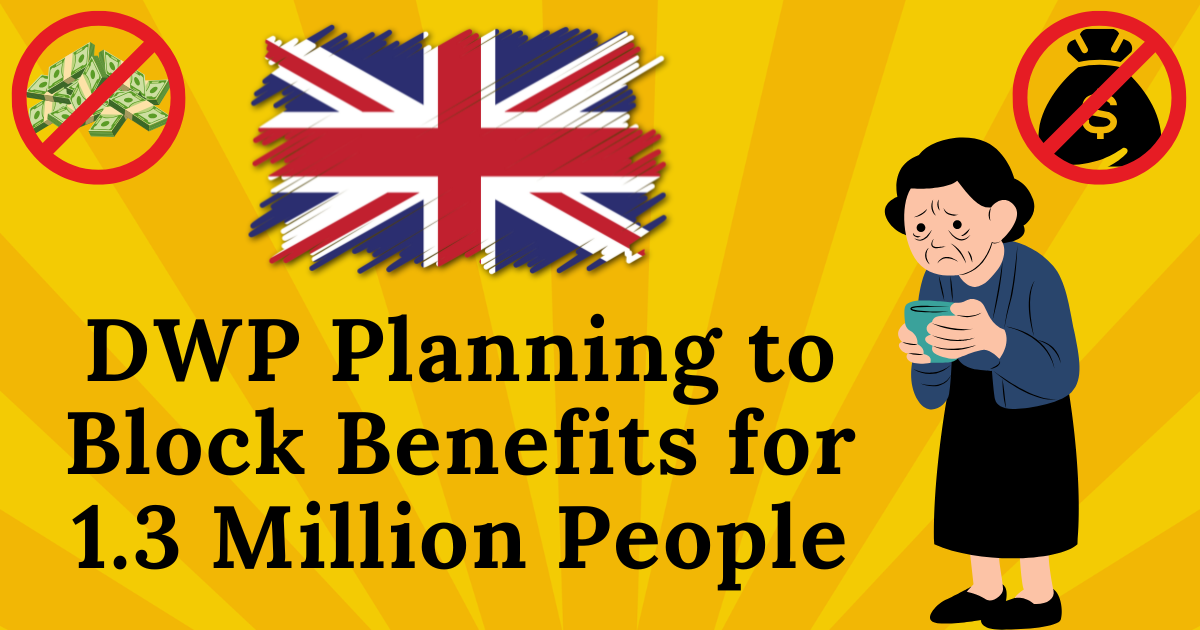DWP Planning to Block Benefits for 1.3 Million People: Are you one of them? The new DWP plan by the government of the UK can block 1.3 million people from claiming benefits. The government made this major decision to decrease welfare spending and motivate people to find employment. To learn more about the topic ‘DWP Planning to Block Benefits for 1.3 Million People: Are You One of Them?’, please keep reading the article.
DWP Planning to Block Benefits for 1.3 Million People
The UK Department for Work and Pensions (DWP) has announced primary changes to healthcare benefits that may impact the lives of up to 1.3 million people. The main objective behind this significant decision by the DWP is to make the working capability assessments (WCA) of people tougher and to a brand new sick pay assurance for low-earnings workers. However, there are certain arguments that this change may leave vulnerable individuals struggling to make ends meet.

Check Payment Dates
Check New Payment Amount
Check Payment Increase News
Check New Eligibility Criteria
The main aim of the new DWP rules is to decrease the number of people on sickness benefits, but they could significantly impact those with long-term health conditions. If you already receive these benefits, it’s important to understand the changes, gather medical evidence, and prepare for potential reassessments. Get legal and financial advice if required, and consider employment options that suit your capabilities.
Key Highlights
| Particulars | Details |
| Individuals Affected | Up to 1.3 million healthcare benefit recipients |
| Major Change | Toughened Work Capability Assessments (WCA) to reassess eligibility |
| Economic Impact | Some claimants may lose up to £5,000 annually |
| Government Objective | Reduce welfare spending by £1.3 million from disabilities benefits |
| New Sick Pay Guarantee | 80% of wages covered from day one of sickness for low-income workers |
| Support for Job Seekers | Employment training programs, mental health support, workplace accommodations |
| Effects on Employers | New hiring wages for businesses hiring reassessed claimants |
| What to do Next | Seek professional advice, review eligibility, and prepare for reassessments |
| Official Website | Department of Work and Pensions (DWP) |
Major Changes by DWP
Rigorous Work Capability Assessments (WCA)
The Work Capability Assessment (WCA) evaluates if an individual is eligible for illness benefits like Employment and Support Allowance (ESA) or the health component of Universal Credit. The changes will make the assessment criteria stricter, making it more difficult for people to qualify.
This implies that people with illnesses like chronic pain, depression, and anxiety might be considered suitable for employment. Recipients will need stronger medical evidence proving how their condition prevents them from working. Individuals may be needed to attend work-related activities even if they were already eligible for benefits without work responsibilities.
Removal of the “Limited Capability for Work” (LCW) Category
In the previous rules, the individuals who were in the category of limited capability for work (LCW) got monetary assistance without the need to find a job. In the new plan, this category has been removed. It means that these individuals will have to either actively look for a job or be moved to a lower-benefit payment. At present, some healthcare beneficiaries get an additional £390 per month via Universal Credit. In the new rules, this will be eliminated or they could get fewer payments, which can result in an annual loss of up to £5,000 per individual.
Sick Pay Guarantee for Low-income Workers
One positive change in these modifications is that a sick pay guarantee will now be introduced for low-income workers. At present, workers who earn less than £123 per week are not eligible for Statutory Sick Pay (SSP). Under the new proposal:
- 1.3 million low-income workers will get 80% of their pay from the first day of sickness.
- This will provide better financial protection for people who work in unstable jobs.
- Employers may be required to adjust their policies to suit these changes.
Practical Advice for Affected Individuals
Collect Medical Evidence: Make sure you have detailed medical records from your GP, specialists, and therapists. Ask for a written statement from healthcare providers explaining how your condition affects your capacity to work.
Get Professional Advice: Consult a welfare rights expert before attending your WCA. Organisations like Turn2us and Disability Rights UK offer free legal support for benefit appeals.
Stay Informed: Check regularly for updates on the DWP website. Observe the advice of advocacy organizations such as Citizens Advice and Scope UK.
Explore Employment Support: If you are needed to engage in work-related activities, explore flexible job options such as remote work, freelance work, or part-time roles that align with your health needs.
Engage in Advocacy: Join organisations that work in support of disability rights.
